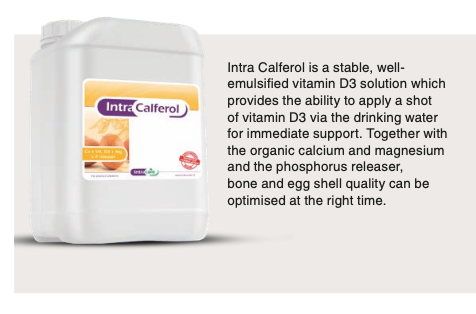Broiler chickens grow bigger and fastercompared to a decade ago and the layingrates of layer hens have increased by20%. To prevent musculoskeletal and eggshell issues, it is of essence to providea good balance of the essential building blocks: Calcium (Ca), Phosphorus (P) and Magnesium (Mg). In order for theseminerals to reach the bones and eggshells in the first place, their bioavailabilitymust be assured.
Vitamin D3 is the key for these minerals to be absorbed from the intestine into the blood. When in deficit, these minerals can’t be absorbed which results in problems with the locomotor system and egg shell quality. Intra Calferol is a liquid nutrient mixture of highly concentrated and stabilized Vitamin D3 alongside organic calcium and magnesium and a phosphorus releaser, which improves the ease of absorption in animal intestines. This supplement is the golden formulation which keeps the animal’s calcium, magnesium and phosphorus balance in optimal condition.
Sunlight is the best source of vitamin D3, but what if there is no sunlight?
On average, broilers and layers require up to 40 IU of vitamin D3 per day to support their growth and health, all while trying to achieve their full genetic potential. When in deficit, softened and weak skeletons and egg shells can be seen on farm resulting in significant economic losses.
To stay healthy, humans need about 10-15 minutes of UVB per day with 40% of our skin exposed. In high performing poultry, Vitamin D3 is formed when sunlight contacts the non-feathered parts such as their legs and feet. However, as most poultry are housed indoors, a Vitamin D3 deficiency can occur. Even poultry in houses with glass windows can suffer from Vitamin D3 deficiencies due to the fact that glass filters out the essential UVB rays for Vitamin D3 formation.
In general, poultry feed contains sufficient Vitamin D3, but these levels can be sensitive to factors like temperature, time, humidity, oxygen and pH. Mixing of Vitamin D3 in poultry feed, transport in lorries and containers or storage in warehouses or silos are factors that can break down Vitamin D3 levels, becoming too low at feeding. On the other hand, sometimes animals need supranutritional support during critical phases of rapid growth or to keep up the high performance of older animals. Also, feed intake is depressed during stressful phases like when in heat stress. These factors could induce musculoskeletal and egg shell quality problems due to vitamin D3 deficiency.
Vitamin D3 is the key for bone and egg shell quality!
- Vitamin D3 is key to the maintenance of essential mineral homeostasis by stimulating its absorption and uptake. Deficiencies of these minerals can result in sub-optimal skeletons and eggshells.
- Development of strong skeletons in broilers and layer hens occur during the rearing phase. The bones itself consists mainly of collagen fibres and an inorganic mineral in the form of small calcium-phosphorus based bio materials, also called ‘hydroxyapatite crystal’. Magnesium acts like “cement between the calcium bricks” and contributes to bone stabilization, growth and mineralization.
- Egg shells are mainly composed of long columns of calcium carbonate (98.2%), phosphorus (0.9%) and magnesium (0.9%). The layer hen will metabolize and transport the total weight of her skeleton several times to produce eggshells during the course of the laying cycle. Especially in older hens (>40 weeks of age) eggshell quality deteriorates and is mainly reflected in an increase of cracked eggs.
The laying hen requires approximately 2.5 g calcium in around 20 hours to produce a fully developed egg of 60g. About 60-70% of the required calcium can be provided via the feed which is not enough to cover the peak in calcium requirement during eggshell formation. All the rest has to be metabolized from the bodily reserves or has to be supplemented at the right time.
Timing is crucial to supplement Intra Calferol
While additional precision supplementation via the feed is not possible, the drinking water is a quick and strategic tool for every poultry farmer to mitigate diminished animal performance during challenging periods. Supplementation is crucial to support the creation of a strong skeleton in broilers and layers during rearing. Furthermore upon facing bone or egg shell issues in older birds, a protocol with only a few days of supplementation can already provide good support.
